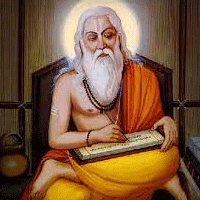Veda Vyas
Krishna Dvaipayana, better known as Vyasa or Vedavyasa, was a legendary sage portrayed in the Hindu epic Mahabharata, and regarded by Hindu-tradition as the compiler of that work.
Born: Kalpi
Full name: Krishna Dvaipayana Veda Vyasa
Parents: Satyavati, Parāśara
Religiuon: Sanathana dharma, Hinduism
Children: Shuka from Vatika,
Dhritarashtra from Ambika,
Pandu from Ambalika
Vidura from Parishrami
Veda Vyasa, who is widely revered and credited for compiling much of Hinduism’s most prominent and influential spiritual texts, including the Vedas, Rigveda, Samaveda, Yajurveda and Atharvaveda, the 18 Puranas, and the world’s largest epic poem, the Mahabharata.
Deemed eternal truths, the Vedas were passed down via an oral tradition for thousands of years before Veda Vyasa is believed to have compiled them in written form. It is said the philosophy of the Vedas was further developed and explained by Vyasa in the Puranas and the Mahabharata (which also includes the Bhagavad Gita — known as the “Song of God”).
Veda Vyasa was born to Satyavati, the daughter of a fisherman. During her youth, while performing her job of ferrying travellers across the Yamuna river, Satyavati met a great sage named Parashara. Becoming attracted to each other, the two went to an island where they could be alone, and ended up conceiving Veda Vyasa. The legend says that being no ordinary soul, Vyasa was born that very day, grew immediately into maturity, and was given the name Krishna Dvaipayana (“Krishna” meaning “dark” and “Dvaipayana” meaning “island-born”).
Determined to live the life of an ascetic, grew up in forests, living with hermits who taught him the Vedas (ancient sacred literature of India). Thereafter he lived in the forests near the banks of the river Sarasvati, becoming a teacher and a priest,gathering a large group of disciples. Vyasa left, but promised Satyavati he would return if she ever needed him.
As providence would have it, Satyavati later became the wife of the emperor of the world, Shantanu. Remembering Vyasa’s promise, Satyavati called upon her first-born and asked him to beget children with the widows of her dead sons. Vyasa agreed, and thus conceived a son with each of the widows, as well as one with a maidservant, producing three sons in total, before returning to his asceticism.
Though dedicated to his spiritual practice, when his mother and the world needed his help to bring stability to the kingdom by producing an heir, he set aside his personal commitments, did what was requested of him, and then returned to his renounced lifestyle without asking for anything in return.
And when he knew the coming of Kali Yuga was imminent, out of compassion, he compiled a plethora of spiritual texts to provide guidance for the people of what is considered the most difficult age. Late in life, living in caves in the Himalayas, he is said to have divided the Vedas into the four traditional collections, composed Puranas, and, in a period of two and a half years, composed his great poetic work, the Mahabharata, supposedly dictating it to his scribe, Ganesha, the elephant god.
Hindu scripture describes Vyasa as being a Chiranjivi, or immortal being who is still alive today, choosing to remain on the earth for the well-being of others until the end of the current Kali Yuga. Some of the more prominent sages of Hinduism’s most significant spiritual lineages — including Adi Sankaracharya and Madhvacharya, are said to have personally met Veda Vyasa and received instruction from him.
Because Veda Vyasa compiled the wealth of spiritual literature used by most of Hinduism’s major lineages, many view him as the original guru, which is why Guru Purnima, the day to pay respects to the guru, is celebrated on his birthday.
The Yoga Bhashya, a commentary on the Yoga Sutras of Patanjali, is attributed to an unknown author called Vyasa, but was probably Patañjali’s own work.
Though the religion has many schools of thought, resulting in a variety of different philosophical conclusions, followers of pretty much every Hindu sect can agree: Hinduism wouldn’t be what it is today if not for Veda Vyasa.

Veda Vyas
Birth Place: Kalpi
Proffession: Author
Nationality: India


